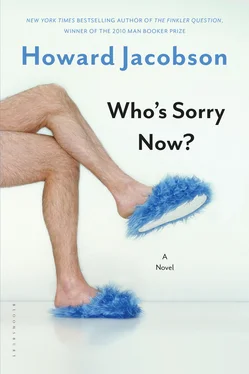‘Mother, look at me. If I went any more feminine I wouldn’t be able to stand up.’
‘There you are,’ her mother said. ‘What are you doing wanting to stand up with a man?’
Hazel looked around the room, decorated in pink and gold, with portraits of statesmen (one of them her father) on the walls and figurines of shepherdesses (one of them her mother) on the mantelpiece. She shook her head. She had been born here. Grown up here. Educated into womanhood here. ‘You know, sometimes,’ she said, ‘I think it’s a miracle I’ve achieved even the little I have. A husband, for a time. A lover, for a time. Two daughters, I hope, for ever. How, given the example you have shown me, have I managed that?’
‘Well, you haven’t managed a sense of humour,’ Hetta Nossiter replied.
‘No,’ Hazel said. ‘No one can accuse me of managing one of those.’
And not for the first time she trudged out of Bloomsbury like a heroine in one of those great novels of humourlessness Charlie had been reading aloud to her — that’s when they weren’t great novels of facetiousness — footsore and weary, determined to put the shames of her past life behind her, but uncertain where her future was to be found.
Kreitman knew the longing he was feeling couldn’t be for Hazel. It made no sense. He had longed for Hazel, first when he was very young and she had gone off to see a school friend for the weekend, leaving him weeping like a baby at the railway station, wondering if he would ever see her again, praying no accident would befall her, longing for her, actually longing for her presence, within minutes of her being gone; and then, an older man, when she had had enough of his delusive tears and turned her back on him, denying him anything that would remind him of their earlier days, no reminiscent smile, no recapitulations in the voice or retrospection in the body, nothing, stone dead nothing — then he would go out walking on his own, and long for her, quite simply and disconnectedly yearn, as for a person who was no more, with that same chasm in the heart the bereaved know, long, long to have the space left by that one shape filled by that one shape — until maybe he would meet some girl and postpone the longing for another time. Yes, yes, he knew how that was judged. Some man of feeling you are, Kreitman, to be deflected from your feelings by any trull that passes! Well, first of all hold with the trull. You haven’t met her. And don’t suppose that a capacity for deflection only ever denotes callousness or coldness. We are many-chambered creatures; the squishy-hearted, the inconsolable weepers at railway stations, having maybe a chamber or two more than most men. And full of longing though we are in one chamber, we are fitted with the means to be full of something else in another. Yeah, full of shit, Kreitman! Suit yourself. But the truth’s the truth: they did not console him, the other women, whether they were women for five minutes or a fortnight or for life, they did not console or compensate or distract him, they simply existed concurrently. They also were .
Shouldn’t it then follow that Kreitman’s longing for Hazel had never gone away but also was , perhaps for all time, in the chamber where his longings were stored? Asked that question a week before, Kreitman would have pooh-poohed it. Longing for Hazel had died. She’d killed it. He’d killed it. Vicissitude had killed it. Sadness was another thing. He would always be sad about Hazel, sad for Hazel, sad from Hazel. But longing was of another order. Longing was as tangible as touching. What you longed for you as good as held, except that you didn’t, which was why your heart broke. And he didn’t feel that way about Hazel. Hazel he did not want to hold. But here was the mystery — if he didn’t want to hold her, why was he imagining her in his hands, and if he wasn’t longing for her, why did his heart break when he realised his hands were empty?
The afternoons were worse. At the best of times Kreitman was not good at afternoons. Work helped as a rule. A shop to go to helped. But the habits of non-attendance which Kreitman had acquired in the weeks waiting for Chas to make her mind up and materialise had stayed with him even now that they were palpably a pair. Most mornings, Chas left him in bed and went to Richmond where there was room at least to swing a cat and write children’s stories. Since Kreitman wouldn’t hear of it that she went home by any method but the Smart, he was Smartless for several hours himself. By the time the Smart was back, Kreitman had lost the will to do anything with his day but wait for it to return to Richmond and collect Chas. ‘I should just give you Maurice,’ he said. ‘That way you’ll end up resenting me for ruining your business,’ she said. ‘Do I have a business?’ he asked her. ‘It was your business that made me fall for you, remember,’ she reminded him. ‘It was your business that showed me you didn’t have a heart of steel.’
So between kissing Chas goodbye and waiting for her return, on those days when she did return, Kreitman idled through his afternoons. The rain hammered on his roof. There was nothing to see from his windows but the tops of umbrellas and the amphibian feet of uncomplaining Londoners. Bizarre to him, the patience of these people. Did nothing stir them to revolt? By three o’clock, flamenco was on his record player and the smell of Moorish dust was in his nostrils. Whereupon the longing started.
Ridiculous, but there was nothing he could do. Anyone seeing me, he thought, would say I have finally got my comeuppance. But then if that’s what I have got, that’s what I have got. It’s not within my power to do anything but suffer it. You can’t get up, pull yourself together and walk away from your comeuppance.
Tears poured down his face. He would walk around the flat to keep his circulation moving, smiting his chest an inch or two above his heart, great thumps with a clenched fist, as though he meant to knock himself off his feet. Maybe a bottle of red wine, maybe not. Occasionally a cigar. He did not want to become a creature of habit. By four he was too upset to trust himself to his feet and had collapsed on his desk, his forehead on his gouging knuckles, the longing banging in his ears.
But tell him this: if the longing was for Hazel, how come it was sparked off by flamenco — music for which Hazel had never expressed the slightest enthusiasm nor shown the remotest aptitude. Had Hazel been a flamenco dancer — no mystery. Had she loved the guitar even — no mystery. But the brutal truth was that Hazel hated flamenco with a passion and, in the days before Kreitman moved his enthusiasms to his den on Clapham High Street, had never missed an opportunity to deride his devotion to it. ‘Finding the gypsy in your soul, Marvin?’ she would call when she caught him with his ears to his speakers, crouched like a beast in pain. In more playful moods she would imitate the castanets, making sluttish expressions with her mouth, as though to imply this was music for the sort of tramps in whose name he had trashed their marriage. On the blackest days she would simply yell, ‘For Christ’s sake, Marvin, will you turn that crap down!’
You see his quandary. How could flamenco move him to yearnings for a woman to whom flamenco was crap?
What he decided was that he was in mourning for companionship, for the companionship of just one woman, and was yearning to be happy. Flamenco reminded him of all the ways a man could be unhappy. Stop playing it. Chas was all set to be the companion of his heart, but she was out of his sight too often. Stop letting her go.
Of course, the way things stood, she had to go. There was no room for her here. To get into bed she had to perform a manoeuvre of which an SAS man would have been proud. To get out of it, especially in the middle of the night, was more perilous still. There was nowhere for her to write. And she had a pair of children growing loopier by the hour to keep an eye on. There was only one resolution to this. He would buy a house for them both. In Richmond if that was what she wanted, though not on the same side of the street as the house she already had. He would get down on one knee, ask her to marry him and buy them a house.
Читать дальше












